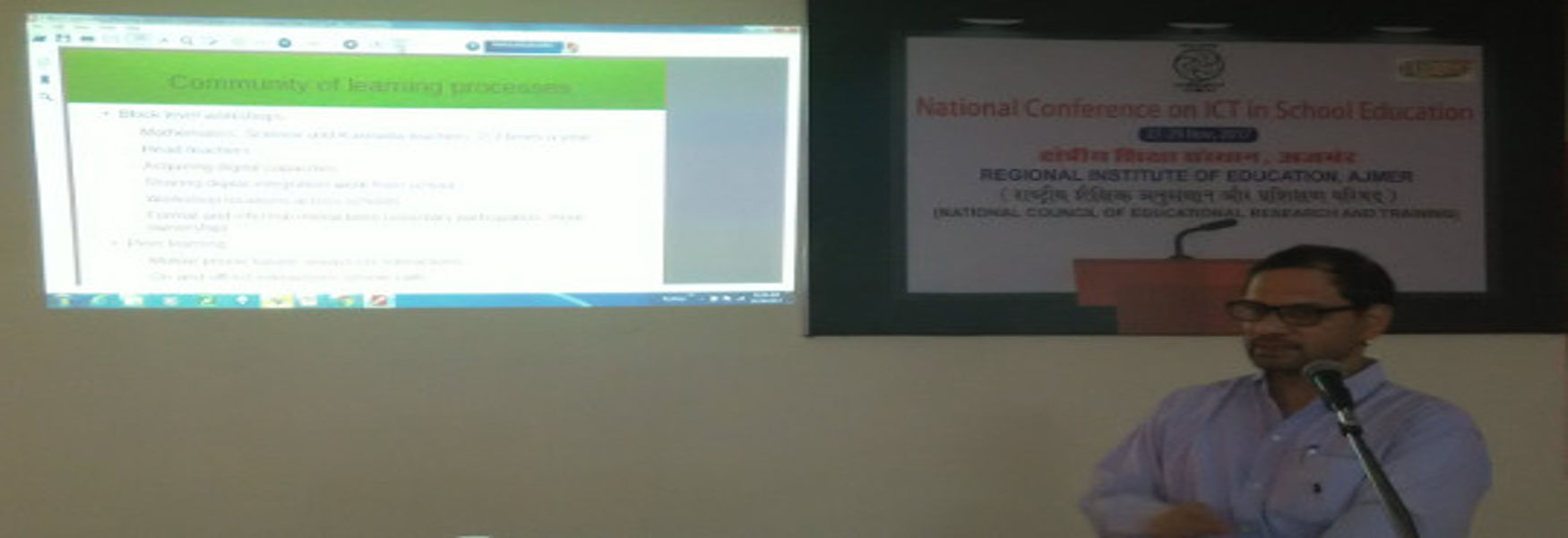
Regional Institute of Education (RIE), Ajmer, Rajasthan, India (NCERT)
The conference provided an opportunity for exchanges of national and international initiatives and experience on ICT in school education, spreading information, and making suitable recommendations for policy planners, academic and administrative staff. The conference focused on a) Exploring innovative use of ICT is teaching-learning-assessment process, b) Use of FOSS tools and OER practices in subject teaching & learning, c) Discuss the use of sophisticated access devices/Ubiquitous Technologies and everywhere learning, d) Exploring efficient management strategies for technology integration initiatives, e) Discuss on more self-directed human resource development approaches using emerging technological possibilities, f) Use of sophisticated assistive technology tools and solutions for Disabled Learners and making classrooms more inclusive based on the principles of universal design for learning, g) Implementing design based research, action research and other applied research in technology integration in education to develop better insight.
Authors - Smt. Radha NA. Assistant Teacher, Government High School, Begur, Bengaluru and Sri. Gurumurthy Kasinathan, Director IT for Change
The paper is based on the experiences and insights of the first author, from her personal learning journey in her teaching and her interactions with peers at school, block, state and national levels, as a Government high school teacher of Mathematics and Science for 8, 9 and 10 grades. The second author, working in an NGO, on programs for integrating ICT in teacher education and school education, has collaborated with first author to explore generic insights and learning from these experiences. The focus of the paper is on the ‘block-level community of learning’, in which both are members and participants.
In the Information and Communication technologies (ICT) era, Communities of Learning (COL) is acknowledged as an important Teacher Professional Development (TPD) method. While ICT supports COL at different geographical levels – school, cluster, block, district, state and nation, this paper explores a ‘block-level COL’ and its impact on TPD. The block-level teacher community has advantages of being compact and working in similar contexts and demographics.
Science and mathematics teacher-members of the ‘Bengaluru South-3 block COL’ meet few times annually (in official and non-official programs), where they present their school work and students’ models, activities and drawings. Meetings are complemented by sharing of ideas, experiences and learnings through WhatsApp and mailing groups, phone and video calls.
Students socio-economic background is largely similar here - urban poor and marginalized, working parents, difficult family situations, offering little home support to schooling.
In a smaller geography of a block, teachers are able to visit other schools, to understand work of COL-peers. Over time, teachers personally know one another, which reduces inhibition or intimidation during real and virtual discussions. They understand how to present with authenticity, clarity and openness in COL interactions. This personal knowledge helps expert teachers / early adopters to create resources specific to the needs of other teachers, and guide them to adapt it for their use.
Benefits
ICT, earlier, a means of communication and entertainment, has become important to TPD. The COL interactions helps teachers get relevant resources, and ideas on teaching, co-curricular challenges such as adolescent education; these cumulatively help them understand teaching-learning contexts, needs and approaches better. COL has motivated many to explore deeper subject understanding, appreciate ICT for peer-learning, class room teaching and changing classroom culture. Collaborative learning helps teachers to think differently about content and methods of transaction, and transforms their vision of education and teaching.
